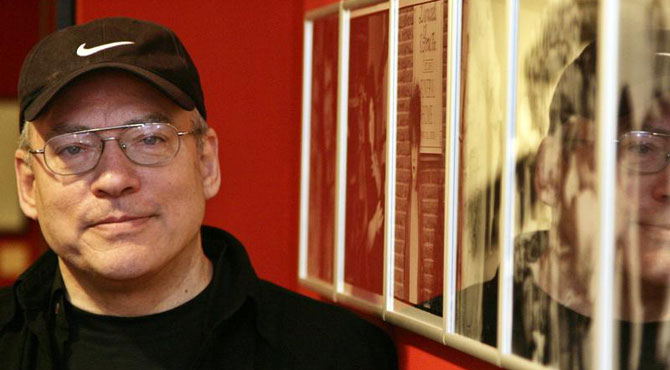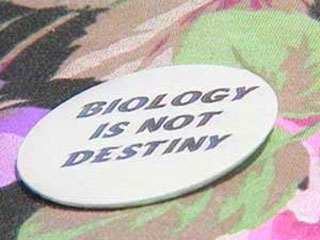Next story: Studio Arena Saga Continues
La Vie En Rosa: Film director Rosa von Praunheim
by Ed Grant
Film director Rosa von Praunheim, whose work shows at Hallwalls on Friday, talks about chronicling gay culture.

Rosa von Praunheim may not be the best-known German director, but like the man himself, his name isn’t easily forgotten. After four decades as a filmmaker, Von Praunheim has grown from a gay renegade in the German “underground” film scene to a well-respected documentarian—albeit one known to moonlight as an aging enfant terrible.
Don’t ask him, for instance, if he approves of the spread of gay marriage in the US. As he recalls the history of gay rights in his home country, “In Germany we were influenced by the student movement in 1968. We wanted a total change of society, a total change of sexuality. We didn’t want the smaller family unit, we wanted bigger groups to come up, the education of children in bigger groups, and not just the possession of one or two children by a frustrated mother. We didn’t want marriage, we didn’t want military, we didn’t want religion.
“Then suddenly there were gay people demanding to have gay churches, demanding to be in the military, demanding gay marriage. All that we didn’t want. That’s what we feared, that the gay movement would be totally bourgeois. We hoped that gay people would offer up something special, influence heterosexual society. [Instead] now you have a very commercial gay scene. You have people fighting for gay marriage, which we have already in Germany. For people who want to do that, it’s okay. But it’s not what we were fighting for. All these socialist dreams didn’t come true, and soon the movement was very bourgeois, and people wanted to adapt to mainstream society.”
I spoke to von Praunheim recently in New York City when the Goethe House co-sponsored a festival of his films at the Anthology Film Archives. First, a short explanation about his nom du cinema: Born Holger Mischwitzky, he took his self-proclaimed “queen”-ly name when he was a fine artist in the early 1960s: “Rosa” is for the red triangle gays were forced to wear in the concentration camps, and Praunheim was a suburb of Frankfurt, when he lived with his parents as a teen.

Asked to reflect on his impressive body of work—70 titles, including features, shorts, telefilms, and miniseries—von Praunheim notes rather humbly, “I’m glad that I was able to do so many films on gay and transgender subjects. German television supported me in that. Here in this country it would be very hard to get funding for political or artistic work, the films would have to be very commercial.”
As a chronicler of gay culture, von Praunheim has made a number of serious, linear documentaries about gay issues, including Transgender Menace (1996, screening at Hallwalls this Friday night, July 10) and a celebrated history of the American gay rights movement, Army of Lovers (1979). Besides the occasional experiment in making a film with a straightforward plotline—like the 1999 period biopic The Einstein of Sex (his only film available on DVD in America)—he has made a number of uncategorizable “acts of provocation.” These films are either outright campfests or politically-charged manifestos.
The film that ignited his career in 1971 belongs in the last-mentioned category, a radical feature that literally yells at its gay audience (“out of the bars, into the streets!”), boasting the wonderfully verbose title It’s Not the Homosexual Who is Perverse, But the Situation in Which He Lives. Consisting of pastel-colored tableaux that depict a provincial lad’s exposure to the repressed and marginalized gay culture in the big city, the film was made for German television and promptly rejected for several reasons, including both its acknowledgment of the underside of the lifestyle (meetings in public toilets) and its savage attack on both bourgeois gays and, by extension, bourgeois straights.
Rosa remembers: “They asked me as a filmmaker who was openly gay and had made three shorts films to make a film on homosexuality. Bavaria Film Studios asked me to do a film for WDR Television and the film came out in 1971 at the Berlin Film Festival. There was a major scandal because it was very provocative, and so television pulled back. But after a press campaign, they aired it on television in 1973.”
By that point the film had already been screened theatrically throughout the county, helping to jump-start a gay rights movement in West Germany.
The message that von Praunheim imparted in that film, and in all of his most notorious works from the 1970s through the 1990s, is simple: “You can’t wait for the state to do everything for you. Liberation has to come from the people themselves. They have to fight, they have to demand their rights, and not just wait and see, until other people are nice and tap you on the shoulder and say, ‘You are wonderful!’”
Although his films are inherently political, von Praunheim also has a keen artistic sensibility. For influences, he names not only Brecht and the German Expressionists, but also American underground legends like Gregory Markopoulos, Jack Smith, and those kitschy national treasures, the Kuchar brothers, who gave the world such hard-to-see classics as Hold Me While I’m Naked and I Was a Teenage Rumpot.
“I like the mixture of education and politics and being very serious, and then also humorous. There’s an ambiguity then, where you wonder whether you are allowed to laugh or not, is this too serious to laugh at? I like to laugh at old Hollywood films and at the same time take them seriously. So there was this Brechtian style I used, this very extreme format, very theatrical, but the content was also very serious and very provocative, so that made it unique.”
Von Praunheim has the distinction of having made the only truly funny film about AIDS, the safe sex primer A Virus Knows No Morals (1985). The film offers a campy take on education films, while also urging its audience to take care and use condoms. “That film started out as an experiment with a theater group. We wanted to educate people about safe sex and at the same time we wanted to do it in a humorous way with exaggerations and so on. And it worked, we toured with the film for a while.”
Von Praunheim also made several extremely serious documentaries during the AIDS crisis that reflected his concerns during the mid/late 1980s. He recalls: “Because I lived in New York City for a long, long while, I knew about the threat of AIDS. In Germany, they said, ‘Oh, AIDS, that’s only in America, it won’t come to Europe.’ There was even a big Left movement in the gay scene that said, ‘Americans are stupid because they have these safe sex programs, they advertise them like soap. We are deep thinkers in Germany, and it takes time to change our behavior.’ And I said, ‘Listen, the virus is very very quick. I mean, you really have to protect yourself!’ When I came back to Germany two or three years later with the political films I had done in New York about the AIDS movement (Silence=Death, Positive), half the audience I had met before was infected. For 10 years, I worked very hard in the AIDS movement, doing talk shows, touring with films. It was a very strenuous time, but also very rewarding because there was a cause to fight for.”
Von Praunheim’s filmography has continued to expand in the 21st-century with a bizarre fiction film about a real-life German case of cannibalism (“No one came to see that film”), and challenging documentaries about gay Nazis in Germany, his own search for his birth mother and a pointed, not-so-flattering portrait of his onetime “competitor,” the ultimate German wunderkind, Rainer Werner Fassbinder. Asked what he has been proudest of, he points to no specific film but explains, “I’m happy that I could do so many films on gay issues, and document so many things that are gone now. Looking back at my films [shot in Germany, NYC and elsewhere] from the ’70s, so many people died. The culture isn’t there any more, and to have it on film is kind of nice. To keep them for eternity, if archives will preserve them.”
And in case anyone thinks his subject matter will mellow as the artist moves into his late 60s, he recently completed shooting a film called The History of Hell.
Says Rosa, “I was raised Catholic. In my youth, all these Catholic priests told us, ‘If you masturbate and have sex, you will go to hell!’ They painted an awful picture of all these tortures. So now, as an older man, I wanted to know, where am I supposed to end up? The film goes back before the Egyptians, the Greeks, and early beliefs, and moves up until the present era. I’m trying to find out in the various religions where I’ll go as a gay man. So many people believe I have to end up in hell!”
Von Praunheim’s Transexual Menace shows at Hallwalls (Babeville, 341 Delaware Avenue at Tupper) on Frday, July 10, at 8pm, as part of the Ways in Being gay series. $7 general, $5 students/seniors, $4 members.
Ed Grant is a Manhattan-based writer whose interviews with cult celebrities can be found at www.MediaFunhouse.com.
blog comments powered by Disqus|
Issue Navigation> Issue Index > v8n28 (week of Thursday, July 9th, 2009) > La Vie En Rosa: Film director Rosa von Praunheim This Week's Issue • Artvoice Daily • Artvoice TV • Events Calendar • Classifieds |









 Current Issue
Current Issue